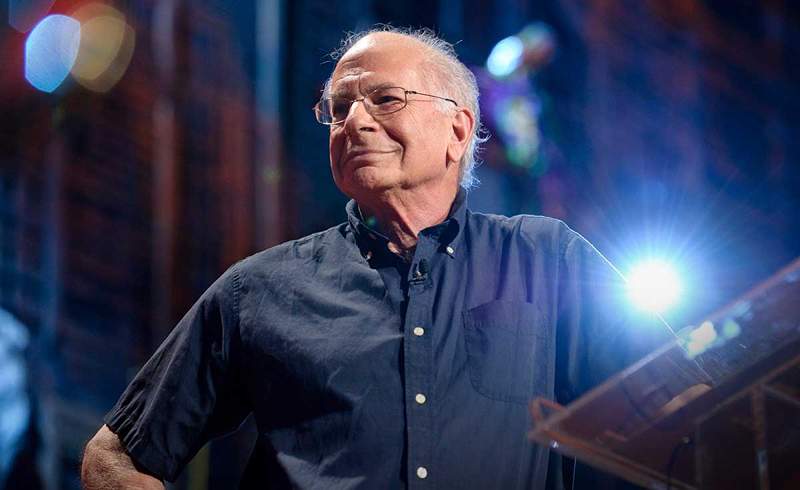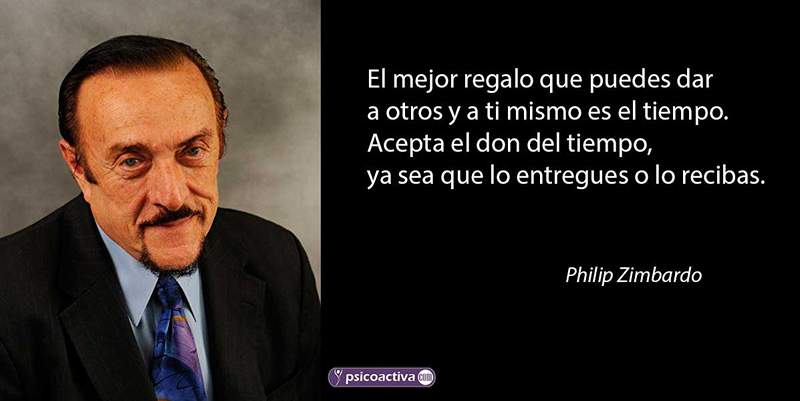Biography of Daniel Kahneman (1934)

- 705
- 209
- Hugh Greenholt
Contemporary psychology has been built based on the contributions of notable figures such as Daniel Kahneman. This author is considered one of the most notable psychologists of our time. Their works on trial and decision making They are usually taken as referents in a new field of studies: Behavior economy.
Its impact on the field of economic sciences was such that it was awarded the Prize of the Bank of Sweden of Economic Sciences. For that reason, it is important to know more about the life and jobs of this author in current psychology.
Content
Toggle- Who is Daniel Kahneman?
- Career path
- Daniel Kahneman contributions to psychology
- Prospective theory
- Law of small numbers
- Behavioral economy
- Other contributions to psychology
- Is Daniel Kahneman an economist?
- References
Who is Daniel Kahneman?
Daniel Kahneman is an Israelo-American psychologist who was born on March 5, 1934 in Tel Aviv, Israel. His childhood passed in Paris, France, a place where his parents, Rachel and Efrayim, had emigrated, in the early twenties, since their native Lithuania.
That is, in 1940, When Paris was occupied by Nazi Germany during World War II, Kahneman and his family were there. Even his father became arrested in a raid against French Jews, but was released a few weeks later with the help of his employer.
The rest of the war, the family was fleeing. In 1948, they mobilized until Palestine of the British mandate, Before the creation of the State of Israel.
According to him, at that time the Jews had to carry David's star in his clothes and fulfill a touch touch. On one occasion, he was until after 6pm (Hour of the touch of curm) playing at his Christian friend's house. In order to hide, he turned his sweater where he had the star and began walking to his house that was a few blocks. On the way, he saw a German soldier with SS uniform who looked at him carefully.
On many occasions his mother told him about how dangerous these people were and advised him to move away. However, the soldier signaled him to approach, in doing so, he raised him, hugged him and spoke to him with joy. Then he showed him the photo of a child, gave him money and let him go. Following this event, Kahneman realized how complex human behavior is.
In 1954, Daniel Kahneman obtained his title of Psychology and also a Master in Mathematics, both at the Hebrew University of Jerusalem. Later, in 1958, he made his doctorate in psychological at the University of California at Berkley.
Daniel Kahneman's first wife was Irah Kahneman, Another psychologist like him, with whom he had two children. His second wife was the cognitive psychologist Anne Treisman, with whom he was from 1978 until she died, in 2018.
Career path
Deepening his career as a professor, author Julio Cruz, in his dissertation on A new Nobel Prize in Economics for Psychology, indicates that Daniel Kahneman worked as a professor at the Hebrew University of Jerusalem, between 1961 and 1978; at the University of British Columbia, from 1978 to 1986 and, later, at the University of California in Berkeley, between 1986 and 1994 and then linked to Princeton University.
In addition, it is remarkable that Kahneman's work has been the subject of many awards, Among those granted by the National Academy of Sciences, the American Academy of Arts and Sciences, the Econometric Society, the Society of Experimental Psychologist, the American Psychological Association, among others.
Among his most outstanding works are Attention an effort (Attention and effort), of 1973; Judge Under Uncertainty: Heuristics and Biasa, 1982; Well-Being: The Foundations of Hedonic Psychology, 1999; Choices, Values and Frames, With masters Tversky, from the year 2000, and Heuristics and Biasaes: The Psychology of Intuitive Judge (2002).
He is a member of the National Academy of Sciences, of the United States, of the Philosophical Society, of the United States Psychological Association, of the Academy of Arts and Sciences, of the Society of Experimental Psychologists and the Econometric Society. In Spain it is also part of the Royal Academy of Economic and Financial Sciences, since 2012.
 47 Philip Zimbardo phrases about social psychology
47 Philip Zimbardo phrases about social psychology Daniel Kahneman contributions to psychology
At present, Kahneman works as a professor at Princeton University in the United States. As we mentioned at the beginning, it has made notable contributions to psychology and economy. Initially, their investigations focused on attention and perception, but later became interested in studying trial and decision making. In this way, he managed to prepare great works that remain the current standard.
Prospective theory
Kahneman and Tversky developed prospective theory together in 1979 to explain the decision -making process. His work is based on empirical evidence and describes various factors that affect human elections:
- Status quo. Sometimes, the alternatives that are presented do not offer a greater level of satisfaction to current circumstances. In other words, if a person feels comfortable with the type of life he leads, it is unlikely to choose something else. Even in cases where alternatives would offer a higher quality of life or other possibilities.
- Endowment effect. It is related to the value we assign to things. For example, a child who prefers a toy with whom he grew up to another much newer and expensive. The infant feels happy with his toy because he has a special value for him.
- Loss aversion. Explains that for humans losses weigh much more than possible profits. If in a game they tell you that you must invest $ 500 to win $ 1000, it is unlikely that you participate. In the end, the idea of losing $ 500 generates more aversion than pleasure of perhaps gain $ 1000.
Law of small numbers
This is another contributions by Daniel Kahneman and Amov Tversky in relation to human perception and decision making. The law of small numbers indicates a tendency to think that a small sample is equally representative as a population. To illustrate it better, let's imagine that we see a political survey where they inform us that 80% of voters prefer option 1.
Following this line, the law establishes that our tendency would be to assume that this represents most of the opinion. But, we do not take into consideration the fact that this survey was conducted with a group of only 100 or ten people. In that sense, it is not rational to think that ten or 100 represent the opinion of the majority.
Behavioral economy
The behavioral economy is a field of studies that use the discoveries of psychology to understand how people make financial decisions. Similarly, they try to explain how these elections affect the market. One of the main works of this area is Towards a positive theory of consumer choice by Richard Thaler.
It is important to note that Richard Thaler elaborated this article based on the prospective theory of Daniel Kahneman and Amov Tversky. In addition, both are good friends and consider that they influence the thought of the other constantly.
Other contributions to psychology
In the nineties, Kahneman began taking another direction on his investigations, focusing more on hedonistic psychology, studying those experiences that make life more pleasant or not; feelings of pain, pleasure, interest, joy, satisfaction and dissatisfaction. Almost all the investigations he carried out on this area ended in a volume that collects their studies on subjective affection and well -being.
Also, Kahneman, together with David Schkade, They developed the idea of focus illusion, to approach the mistakes that many people make when they estimate the effects of various scenarios on their happiness in the future.
This idea is also known as Affective forecast, Studying widely by Daniel Gilbert, and refers to the illusion that people feel on a certain factor and the impact that he will have on happiness, but exaggerating the relevance of said factor and ignoring others that are more shocking.
Is Daniel Kahneman an economist?
It is common to find references about this theorist who describes him as an economist apart from a psychologist. However, in reality, Kahneman has no degree in economics. This confusion is due to the award he received from the Sweden Bank in Economic Sciences. It is also possible that Kahneman's position as a member of the Royal Academy of Economic and Financial Sciences is related.
Kahneman's contributions have been relevant since with them he takes distance from economic neoclassical theories.
While his contributions were essential for the economy, it is a mistake to consider it an economist. In conclusion, Daniel Kahneman is one of the most notable psychologists of our time and his jobs continue to open paths for science. In turn, they explore new questions that help us advance the understanding of human behavior.
As you can see, Daniel Kahneman is an author whose thought occupies a prominent place, not only for psychology, but also for economic sciences.
References
- Cruz, j. AND. (2003). Daniel Kahneman: a new Nobel Prize in Economics for Psychology. Latin American Magazine of Psychology, 35(1), 119-121.
- Kahneman, d., Knetsch, j. (1991). Anomalys. The Endowment Effect, Loss Aversion, and Status Quo Bias. The Journal of Economic Perspectives, Vol. 5, no. 1. 193-206.
- Kahneman, d., & Tversky, to. (2013). Prospect Theory: An Analysis of Decision under Risk. In Handbook of the fundamentals of Financial Decision Making: Part I(pp. 99-127).
- Kahneman, d., & Tversky, to. (2013). Choices, Values, And Frames. In Handbook of the fundamentals of Financial Decision Making: Part I(pp. 269-278).
- Kahneman, d., Slovic, s. P., Slovic, p., & Tversky, to. (EDS.). (1982). Judgment Under Uncertainty: Heuristics and Biasa. Cambridge University Press.
- Shefrin, h., & Statman, M. (2003). The Contributions of Daniel Kahneman and Amos Tversky. The Journal of Behavioral Finance, 4(2), 54-58.
- Tversky, a., Kahneman, d. (1981). The Framing of Decions and The Psychology of Choice. Science, New Series, Vol. 211, no. 4481. 453-458.
- « Thomas Holmes and Richard Rahe's social readjustment scale
- Is it important to keep the friends of childhood? »

